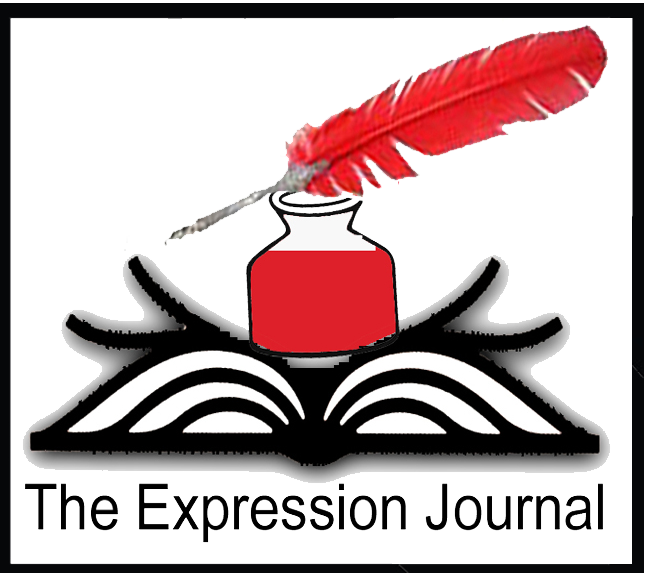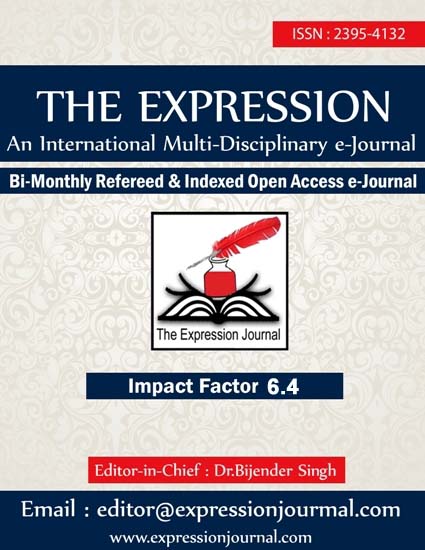- 12
- :
- 37
- :
- 56
Whats App: 91-8168857428
The Expression: An International Multidisciplinary e-Journal
ISSN: 2395-4132 (Online)| A Peer-Reviewed Journal | Impact Factor: 6.4

Impact Factor

Call for Papers: Vol. 10 Issue 1
Other Links

For Authors
- How to Get Published?
- Send Paper with Abstract & Keywords
- Submit Paper Online
- Track Your Paper Online
Archives
Editor's Books
Expression Journal Board
Downloads
Editorial Address
EDITOR-IN-CHIEF
Dr. Bijender Singh
1009, Sector 30,
Industrial Model Township,
Rohtak, Haryana-124001
Whats App: 91-8168857428
Email: drsoora@gmail.com
Open Access Overview
What is Open Access?
By Open Access, we mean the free, immediate, availability on the public Internet of those works which scholars give to the world without expectation of payment – permitting any user to read, download, copy, distribute, print, search or link to the full text of these articles, crawl them for indexing, pass them as data to software or use them for any other lawful purpose.
Why Open Access?
Funders invest in research in order to accelerate the pace of scientific discovery, encourage innovation, enrich education, and stimulate the economy – to improve the public good. They recognize that broad access to the results of research is an essential component of the research process itself. Research advances only through sharing of results, and the value of an investment in research is only maximized through wide use of its results. Yet, too often, research results are not available to the broadest community of potential users. The Internet provides a new opportunity to bring information to a wider audience at virtually no marginal cost, and allow them to use it in new, innovative ways. This has resulted in a call for new framework to allow research results to be more easily accessed and used—a call for Open Access.
Who Benefits from Open Access?
1. Researchers:
Increases readers’ ability to find use relevant literature
Increases the visibility, readership and impact of author’s works
Creates new avenues for discovery in digital environment
Enhances interdisciplinary research
Accelerates the pace of research, discovery and innovation
2. Educational Institutions:
Contributes to core mission of advancing knowledge
Democratizes access across all institutions – regardless of size or budget
Provides previously unattainable access to community colleges, two-year colleges, K-12 and other schools
Provides access to crucial STEM materials
Increases competitiveness of academic institutions
Students
Enriches the quality of their education
Ensures access to all that students need to know, rather what they (or their school) can afford
Contributes to a better-educated workforce
3. Research Funders:
Leverages return on research investment
Creates tool to manage research portfolio
Avoids funding duplicative research
Creates transparency
Encourages greater interaction with results of funded research
4. Businesses
Access to cutting-edge research encourages innovation
Stimulates new ideas, new services, new products
Creates new opportunities for job creation
5. Public:
Provides access to previously unavailable materials relating to health, energy, environment, and other areas of broad interest
Creates better educated populace
Encourages support of scientific enterprise and engagement in citizen science
Why start with public access?
“Governments would boost innovation and get a better return on their investment in publicly funded research by making research findings more widely available… And by doing so, they would maximize social returns on public investments.” –Organization for Economic Cooperation and Development Widespread access to publicly funded research results is an essential, inseparable component of our nation’s investment in science.
Results of publicly funded research should be shared in cost-effective ways in order to stimulate discovery and innovation, and advance the translation of this knowledge into public benefits Enhanced access to and expanded sharing of information will lead to usage by millions of scientists, professionals, and individuals, and will deliver an accelerated return on the public’s investment in this research. More...
login
Notice Board
- News
Journal Submission Submissions are open for Vol. 10 Issue 1 (February 2023 Issue) of the Expression Journal.
- News

Watch Video: Strong Motivation https://www.youtube.com/watch?v=KF2_SMMLntQ&t=32s
- News
Membership Those people who want to remain the member of editorial, advisory or reviewers' board of this journal, they must be in touch with the editor and they have to pay membership fee annually/as per plan, failing which their names may be deleted from the list.
- News
Urgent Atttention We are not accepting online submissions. Please don't email at editor@expressionjournal.com as it is also deliberately unfunctional due to some unavaiodable reasons. Please send all manuscripts only at drsoora@gmail.com
- News
Watch Video: 50 Ways to Avoid Online/Cyber Fraud https://www.youtube.com/watch?v=-055oDpUU7U
- News
Watch Video: Why students fail? || Reasons why students fail || Reasons behind students' poor performance || https://www.youtube.com/watch?v=3XpKGCd7RRU&t=4s
- News
Subscribe These You Tube Channels Link for Our YouTube Channel: https://www.youtube.com/@Bijenderaa Link for Our YouTube Channel: http://www.youtube.com/@dilonkedarmiyan Subscribe these channels. The first channel is related to important issues connected to life, and the second channel is for those who are poets/shayars/ghazal writers.
- News
Watch Video: CBSE/State Exams में Top कैसे करें? https://www.youtube.com/watch?v=JfMB--H6PHI&t=6s
- News
Watch Video: Why to Learn? || How to Learn? || Students' 90 Day Challenge https://www.youtube.Aom/watch?v=KLwuFp7_du4&t=5s
- News
Watch Video: Students must not commit these 101 mistakes https://www.youtube.com/watch?v=OOMoxRVvNfY&t=2s
- News
Watch Video: मौत का खतरा: ये गलतियां कभी नहीं करनी चाहिए || छोटी लापरवाहियों में है जा� https://www.youtube.com/watch?v=gvG85Zl_YFE&t=4s
Impact Factor: 6.4
.png)
ISSN 2395-4132

Approved By
Global Indexing
Open Access Journal

Android App

CC License

This work is licensed under a Creative Commons Attribution-ShareAlike 4.0 International License.
Testimonials
Publication Address
Dr. Bijender Singh
440, Sector 5, Rohtak, Haryana-124001
Rohtak, Haryana
Email: drsoora@gmail.com






